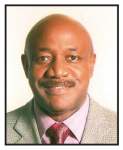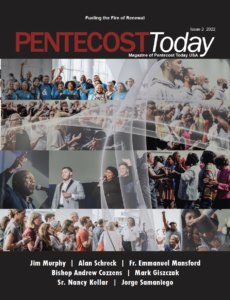Saint Paul wears many hats. One of his more common titles is “the Apostle of the Gentiles.” Yet, the Charismatic Renewal has adopted him as “the Charismatic Apostle” especially, but not exclusively, for his teaching on the charisms—manifestations of the Holy Spirit—in 1 Corinthians 12. Another title awarded to him is “the Apostle of Unity.” The latter is of a particular importance to us this year as we are reflecting on unity, what it really entails, how it is witnessed in the prayer groups and between the different ethnic groups.
Unity not Uniformity
The experience at the Duquesne retreat was at the genesis of the Catholic Charismatic Renewal. Because of that, there is a tendency to consider the American charismatic expression as normative. I still remember those explosive charismatic conferences at Notre Dame, Indiana three decades ago. The songs, the music, the prophetic words, the shouts of joy, the unfolding of the service, the manifestations of the Holy Spirit, and the whole ambiance were unique, and so different from any spiritual gathering that I had ever attended thus far. Since it was a new phenomenon in the Catholic Church, that particular expression of the charismatic assembly was considered to be the point of reference for any other ethnic group that wanted to engage in the charismatic experience.
Back at our parishes we wanted to repeat that charismatic experience. But to us, there was only one expression of that experience: the Indiana one, as if the Holy Spirit had only one way of manifesting himself. We had forgotten for a while that the Holy Spirit was a creator not a manufacturer. We found ourselves busy trying to transfer the Indiana ambiance on Haitian soil. We were translating some songs and imitating some gestures and some wording of the prophetic messages.
However, slowly but surely, in the spirit of Vatican II which strongly insisted on enculturation in any evangelization effort, we started to allow the Spirit to utilize our resources in giving a distinctive Haitian flavor and expression to our charismatic gatherings. The Holy Spirit generated some spiritual composers with words and rhythms that would touch the sensitive fibers of our souls. For instance, the “Kore Mwen” of Jean-Robert Themistocle, is a typical Haitian expression, difficult to translate into other languages and yet carrying for the Haitian people a moving connotation. The Holy Spirit has also inspired us to modify certain spiritual practices according to the specific needs of the Haitian people. For example, discerning the multiple elements of suffering in our history, socioeconomic struggles, education system, some cultural practices, the rapport between the government and the governed. We found it appropriate to have a whole service of healing and deliverance in the Seminars of the Life in the Spirit, before the effusion of the Holy Spirit.
If the Spirit has allowed us to express our charismatic spirituality differently, is he suggesting that each ethnic group should remain separated? In other words, does diversity entail division? Absolutely not. The Spirit who is infinitely creative wanted us to avoid confusing uniformity with unity. That all the ethnic groups express their charismatic spirituality in the same shape and form would be a demonstration of uniformity, not of unity. Saint Paul did not advocate uniformity but unity in diversity. We need to welcome diversity as a blessing instead of running away from it as a curse. “Diversity of gifts but the same Spirit. Diversity of service but the same Lord. Diversity of ministry but the same God (1 Cor 12:5-6). This understanding of unity in diversity is even stronger in verses 17-19 of the same chapter.
“If the whole body were an eye, where would be the hearing? If the whole were hearing, where would be the smelling? But now God has set the members, each one of them, in the body just as He pleased. And if they were all one member, where would the body be?”
After the listing of the charisms in verse 11, Paul comments: “But one and the same Spirit works all these things, distributing to each one individually as he wills.” I think it is not farfetched at this point to consider each ethnic group as a gift to the others. With such a consideration, we can see Paul urging the different ethnic groups of the Renewal to help each other discern, discover and develop their own charisms in order to proclaim to all the nations the wondrous deeds of a God rich in diversity. This consideration is important if we don’t want our different ethnic groups to fall into another harmful way: the cliques.
The Cliques
Allow me to go back to Paul and his first letter to the Corinthians. All of Paul’s letters have been prompted as a response to problems faced by the communities that he founded. The Jesus-people of Corinth dispatched Chloe to Ephesus to seek Paul’s advice on some issues that they were confronting. One of them was the formation of cliques. The cliques came from the Corinthians’ misconception of baptism. All the people baptized by the same person formed a clique around that person as a leader and that practice was fracturing the Jesus-people community of Corinth. In his pastoral response to this issue, Paul reminded them what baptism does for them. Among other things, it makes them belong to Christ (1 Cor 3:21-23).
“No more boasting about following a particular human leader! For everything belongs to you, whether Paul or Apollos or Peter, or the world, or life and death, or the present and the future. Everything belongs to you, and you belong to Christ, and Christ belongs to God.”
If we are not open to welcome, to discover and to encourage the different ways that the Spirit works in the other ethnic groups, our temptation to ethnocentrism is great. This practice is all the more pernicious in that it suggests the superiority of one ethnic group over the other. And that would be a very poor witnessing of the Spirit of love and unity. The allegiance to an ethnicity would be made at the expense of the allegiance to Christ. The above passage of Paul is very relevant to the Charismatic Renewal of the 21st Century. I hear in this passage an invitation to a Eucharistic renewal as well. We all belong to Christ. We are the body of Christ, and our cliques lead to a disintegration of that body instead of its edification. The Charismatic Renewal must pray more attentively and fervently this Eucharistic prayer:
“We thank you for counting us worthy to stand in your presence and serve you.
May all of us who share in the body and blood of Christ
be brought together in unity by the Holy Spirit” (Eucharistic Prayer II).

Garvey Ervilus
Garvey Ervilus was born in Haiti and became involved in the Renewal in 1978. He moved to Miami in 1988 where he is an elementary school teacher. He has been responsible for dramatizations at the Haitian National Congress since 1993. He is married and has two children.

 Click Here for us to pray for your intentions through our new website.
Click Here for us to pray for your intentions through our new website. 
